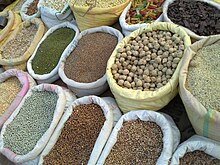Grain
Appearance
(Redirected from Corn)

A grain is a small, hard, dry seed, with or without an attached hull or fruit layer, harvested for human or animal consumption. A grain crop is a grain-producing plant. The two main types of commercial grain crops are cereals and legumes.
Quotes
[edit]- If any one owe a debt for a loan, and a storm prostrates the grain, or the harvest fail, or the grain does not grow for lack of water; in that year he need not give his creditor any grain, he washes his debt-tablet in water and pays no rent for this year.
- Section 48 of the Code of Hammurabi (translated by Leonard William King, 1910).
- Alternately translated as: If a man owe a debt and Adad inundate his field and carry away the produce, or, though lack of water, grain have not grown in the field, in that year he shall not make any return of grain to the creditor, he shall alter his contract-tablet and he shall not pay the interest for that year.
- When, upon the hill of heaven and earth, An spawned the Anuna gods, … there was no small grain, grain from the mountains or grain from the holy habitations. There was no cloth to wear; … the people of those days did not know about eating bread. They did not know about wearing clothes; they went about with naked limbs in the Land. Like sheep they ate grass with their mouths and drank water from the ditches.
- Debate between Sheep and Grain (mid to late 3rd millennium BC). [1]
- Whoever has silver, whoever has jewels, whoever has cattle, whoever has sheep shall take a seat at the gate of whoever has grain, and pass his time there.
- Enki, in Debate between Sheep and Grain (mid to late 3rd millennium BC). [2]
- If you have not got enough grain, I myself shall have grain brought in to you. My lord has become distressed about the battles in Elam. But the Elamites' grain rations have quickly been exhausted, so do not slacken your forces! Do not fall head first into their slavery, nor follow at their heels!
- Ishbi-Erra to Ibbi-Sin, Letter from Ishbi-Erra to Ibbi-Suen about the purchase of grain, Correspondence of the Kings of Ur, Old Babylonian period, ca. 1800-1600 BC, at The Electronic Text Corpus of Sumerian Literature; their original date of composition and their historical accuracy are debated.
- Our production system takes abundant grain, which hungry people can't afford, and shrinks it into meat, which better-off people will pay for. But … our production system not only reduces abundance but actually mines the very resources on which our future food security rests.
- Where there is no grain, this is a sign of vengeance turned towards a city.
- Whether it is roasted or not, you should sprinkle the grain.




